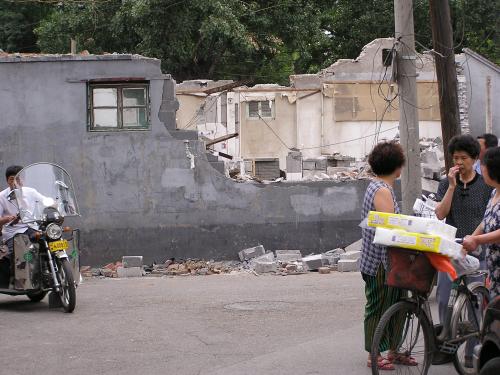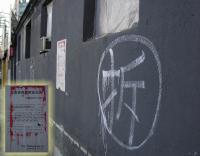Forced Evictions and the 2008 Beijing Olympics
 By the time the Summer Olympics get underway this August, 1.5 million people will have been forced from their homes as a result of the build-up to the Summer Games, according to the Center on Housing Rights and Evictions (COHRE), an independent international human rights organization dedicated to securing economic, social, and cultural rights, with a special focus on housing.
By the time the Summer Olympics get underway this August, 1.5 million people will have been forced from their homes as a result of the build-up to the Summer Games, according to the Center on Housing Rights and Evictions (COHRE), an independent international human rights organization dedicated to securing economic, social, and cultural rights, with a special focus on housing.

Destruction of traditional Hutongs in Beijing
“Human Rights Watch research has documented how China’s rapid urban development, fueled in Beijing by preparations for the 2008 Olympics, is leading to the eviction of homeowners and tenants in violation of Chinese law and international standards on the right to housing.”
Source: http://china.hrw.org

By the time the Summer Olympics get underway this August, 1.5 million people will have been forced from their homes as a result of the build-up to the Summer Games, according to the Center on Housing Rights and Evictions (COHRE), an independent international human rights organization dedicated to securing economic, social, and cultural rights, with a special focus on housing.
Forced evictions resulting from the build-up to major events such as the Olympics are not a new phenomenon. COHRE reports that, in the last 20 years, more than 2 million people around the world have been displaced by the Olympics, and of those people, it is most often minorities and the poor that are affected.
But the problem has been particularly bad in Beijing, so much so that COHRE named the Beijing Municipality and the Beijing Organising Committee of the Olympic Games (BOCOG) as recipients of the COHRE 2007 Housing Rights Violator Awards. According to COHRE’s Web site, the “award” is presented to “governments or public institutions guilty of particularly serious housing rights violations in the preceding year.”
One person familiar with the problem (the person travels to China regularly, and therefore asked to remain anonymous) summed up the situation in Beijing as this: “If you’re in the way of the Olympics, [the government] just razes you out. It doesn’t matter if your family has lived in that home for 100 years.”
That person went on to explain, “What you see in Beijing is [the government saying it] wants to smooth the streets, put trees in, and demolish ‘unseemly’ sights, but often there is nothing wrong with the areas that are being razed according to the people who live there. It’s all about image. It’s about what [the Chinese Communist Party] wants to put on display. It’s political theater.”
In fact, COHRE and the UN Centre for Human Settlements (UNCHS) have both noted that it is most often “’beautification’ projects” staged in the lead-up to “mega-events” such as the Olympics that are given as justification for the forced evictions that often accompany the events. And as UNCHS noted in one of its reports, “Often, such evictions are undertaken with bulldozers, supported by heavy police presence, and the targets of such forced evictions are nearly always the residents of poor informal settlements or slums.”
For some time, some of the victims of forcible evictions would gather in Beijing to petition the central government for some sort of redress. Perhaps not surprisingly the “Petitioners’ Village”—a makeshift community in which those persons lived while awaiting their chance to voice their grievance—was recently torn down as well.
A small percentage of forcefully evicted residents opted for another form of protest against the injustice thrust upon them: self-immolation. These scenes became so prolific that Beijing actually passed laws against suicide protests.

“People were so outraged, not just about their houses, but about the injustice, that they were willing to die in protest,” explained our source. “It’s an injustice. The Chinese people are very reasonable. They want very little. But when you so openly just rob them not just of their property, but their dignity—dragging them out of a place where they and their family have lived, and there is nothing they can do about it—they just feel complete despair.”
For more on the problem of forced evictions, visit http://www.cohre.org/.
Posted on June 6, 2008

